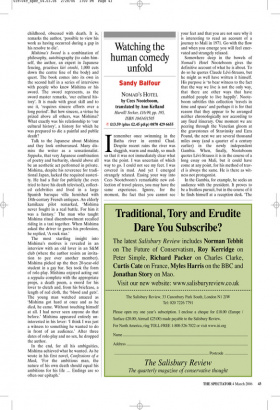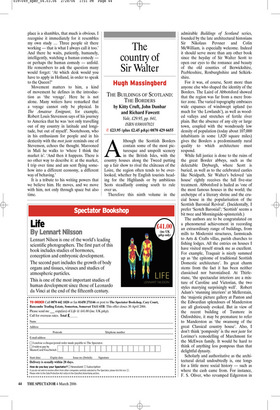Watching the human comedy unfold
Sandy Balfour
NOMAD’S HOTEL by Cees Nooteboom, translated by Ann Kelland Harvill/ Secker, £16.99, pp. 195, ISBN 1843431505 ✆ £13.59 (plus £2.45 p&p) 0870 429 6655 Iremember once swimming in the Batha river in central Chad. Despite recent rains the river was sluggish, warm and muddy, so much so that it was not immediately clear what was the point. I was uncertain of which way to go. I could not see my feet. I was covered in mud. And yet I emerged strangely relaxed. Easing your way into Cees Nooteboom’s remarkable new collection of travel pieces, you may have the same experience. Ignore, for the moment, the fact that you cannot see your feet and that you are not sure why it is interesting to read an account of a journey to Mali in 1971. Go with the flow and when you emerge you will feel enervated and strangely relaxed.
Somewhere deep in the bowels of Nomad’s Hotel Nooteboom gives the definitive account of what he is about. To do so he quotes Claude Lévi-Strauss, but he might as well have written it himself. His purpose is ‘to bear witness to the fact that the way we live is not the only way, that there are other ways that have enabled people to live happily’. Nooteboom subtitles this collection ‘travels in time and space’ and perhaps it is for that reason that they appear to be arranged neither chronologically nor according to any fixed itinerary. One moment we are peering through the Venetian gloom at the gravestones of Stravinsky and Ezra Pound, the next we are several thousand miles away (and a quarter of a century earlier) in the newly independent Gambia. When, finally, Nooteboom quotes Lévi-Strauss it is in the course of a long essay on Mali, but it could have come at any point, for his method of travel is always the same. He is there as witness not protagonist.
In the Gambia, for example, he seeks an audience with the president. It proves to be a fruitless pursuit, but in the course of it he finds himself at a reception desk. ‘The place is a shambles, that much is obvious. I recognise it immediately for it resembles my own study ... Three people sit there working — that is what I always call it too.’ And there he waits, patiently, humanely, intelligently, watching a human comedy or perhaps the human comedy — unfold. He remembers to ask the question many would forget: ‘At which desk would you have to apply in Holland, in order to speak to the Queen?’ Movement matters to him, a kind of movement he defines in the introduction as ‘the voyage’. Here he is not alone. Many writers have remarked that a voyage cannot only be physical. In The Amateur Emigrant, for example, Robert Louis Stevenson says of his journey to America that he was ‘not only travelling out of my country in latitude and longitude, but out of myself’. Nooteboom, who in his enthusiasm for people and in his dexterity with the mot juste reminds one of Stevenson, echoes the thought. Marooned in Mali he walks to ‘where I think the market is’. ‘And then it happens. There is no other way to describe it: at the market, I trip over time and am sent flying somehow into a different economy, a different way of behaving.’ It is a tribute to his writing powers that we believe him. He moves, and we move with him, not only through space but also time.











































































 Previous page
Previous page